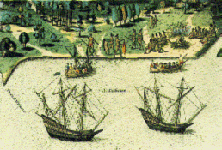

Opinions Column by Dan Elbaum, 10/12/95, from The Daily Illini, page 12.
Last Monday, in an effort to escape my rapidly approaching midterms, I attempted
to find solace under a tree on the Quad. I had just escaped from my 11:00 class and planned
on catching a few hours of sleep before trying to figure out what to write for this week's
column. My blissful slumber was soon disrupted by the shouting and chanting of angry anti-
Columbus demonstrators. After just waking up, my powers of perception tend to be shady at
best, but I believe their rallying cry seemed to be Columbus was a bad guy. To elaborate,
protesters claimed
Columbus was responsible for the genocide and enslavement of the indigenous people of the
Western hemisphere, and the holiday should be renamed Native People's Day to honor the victims
of Columbus' greed and cruelty.
As I departed the Quad for a quieter place to sleep, it occurred to me that until the
demonstration had woken me up, I hadn't even known it was Columbus Day.
When I was younger, I always knew when Columbus Day was approaching. In grammar school,
I memorized inane rhymes about his journey and listened, enthralled, to stories about his
heroic actions while discovering America.In high school, Columbus Day simply represented
a day off from school and I felt indebted to Columbus for allowing me to sleep late on a
Monday morning.
Now in my college years, the only time I hear about Columbus Day is when his critics, not
content to leave him in peace after being dead for more than 400 years, attack him for bringing evil to the Western Hemisphere. Although these attacks
have noble intentions, they are both excessive and misguided.
Before beginning my defense of Columbus Day, I want to establish my liberal credentials so no
one can accuse me of being a conservative. I voted for Bill Clinton, interned for Ted Kennedy
and hate Newt Gingrich as much as any good liberal. However, as much as I dislike the conserv-
ative cause, they are right on this issue and the liberals are wrong.
The critics of Columbus Day would have you believe that Columbus was an evil villain who
brought pain and suffering to this innocent continent. There is no refuting the fact that
the arrival of Europeans killed many of the continent's indigenous people. From the blood-
thirsty Spanish conquest to the American execution of Manifest Destiny, the native people
of this hemisphere were enslaved, swindled and systematically murdered. These abominable
crimes should never be forgotten.
Yet to place these crimes squarely on the shoulders of Columbus and to forget the advancement
his journey represented is simply wrong. Columbus might not have been the god my kindergarten
teacher spoke about, but he was certainly not the Hitler-like, evil figure his critics have
painted him to be.
As most 10-year-olds can tell you, Columbus was an Italian sailor who thought that by sailing
west, he could reach China and India. His calculations were pretty far off and he never quite
picked up the fact that he was nowhere near the Far East, but that doesn't make him evil. He
obviously was not the first to set eyes on this "new world"-the people whom he named Indians
had been there for quite some time, the Vikings had probably made several expeditions to the
Northeast, and there is speculation that the Phoenicians somehow found their way to central
America 2,000 years ago.
If Columbus hadn't found the new world, it was probably only a matter of time before someone
else did. But his discovery marked the beginning of the age of exploration and, in the long
run, a step forward.
ontrary to what the protesters would have you believe, Europeans did not find utopian paradise
in the new world. Aztecs and Incas were cruel conquerors who executed and tortured large pop-
ulations of subservient tribes. Ritual human sacrifices were also adopted by these people.
This does not for a second condone the mass death brought about by the Spanish conquest, but
it is important to realize that things were not perfect before Columbus' boats arrived.
Critics of Columbus give him far too much credit. They say that he was responsible for starting
the intercontinental slave trade and beginning the systematic execution of the local island
populations. Slavery existed in Europe, Africa and the New World far before Columbus was born.
Columbus was merely a product of his time and, compared to most slave traders, he was a light-
weight. As for the execution of the native people, there is considerable doubt about Columbus'
role in that procedure. Many of the natives died from exposure to European diseases, something
Columbus could not have been expected to foresee. To judge this action from the moral stand-
point of the 20th century, rather than the standards of his time, is unrealistic. To blame one
man for the atrocities committed after his death is simply unfair.
Critics also claim that Columbus represents the beginning of European subjugation of the new
world. They're right. But by that same logic, Columbus represents the first step in the process
which led to the Declaration of Independence and the founding of a refuge for the persecuted
people of Europe. It is highly appropriate that some of the sailors who dared to join Columbus
on his dangerous first journey were Jews escaping the Spanish Inquisition. Although a lot of
evil followed the "great American land grab," in the long run, emphasis on long, it was a
good thing.
Have Questions of Comments? Email Jay Edwards
Back to Class Page